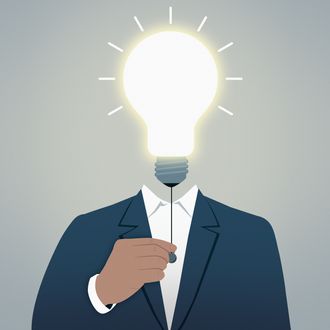
One of the most satisfying, mysterious things about having a brain is the eureka moment when you finally figure out the solution to a problem you’ve been chugging away at for a while. In addition to the fact that it just plain feels good, those moments also reinforce how much stuff is going on in our brain beyond our conscious awareness — sometimes, the solution seems to come from nowhere, and it’s almost always impossible to explain exactly why the eureka occurred at that precise moment.
Naturally, researchers who study human behavior and decision-making are fascinated by this phenomenon, which they call “epiphany learning,” and want to better understand it. And for a new study in Proceedings of the National Academy of Sciences, Wei James Chen and Ian Krajbich of Ohio State University set up a very clever experiment that allowed them to record the phenomenon — or one version of it, at least — in real time.
The experiment was centered around a task called the two-person beauty contest game, or 2BC. Each person picks a number from 0 to 10, inclusive, and whoever’s number is closer to the average of the two numbers multiplied by 0.9 wins. This game has two useful features, for the researchers’ purposes: The first is that if you pick zero, you are guaranteed to at least tie, meaning there’s a “dominant strategy” players can discover. The second is that “[p]rior research has shown that most people initially fail to realize that 0 is the optimal strategy but do eventually figure it out.” So going in, the researchers knew that many of their participants would be experiencing that lightbulb suddenly flicking on, and they’d be there to record it both by recording the behavior itself — specifically, they gave players an option to “commit” to a certain number for the rest of the task, knowing that any player who committed to zero had cracked the game — and tracking the eyes of the player as they gazed at various onscreen options.
In running this experiment, Chen and Krajbich were testing their epiphany learning, or EL, model, which states that as people are working through a problem with a dominant solution, like 2BC, there’s a process going on in their minds in which they slowly accumulate evidence for and against that solution based on their performance during the task. The epiphany itself occurs when the evidence for the solution reaches a certain threshold.
Many of the players, they write, seemed to be “epiphany learners” who played the game in a manner consistent with EL: Specifically, they “increasingly focus[ed] on the optimal strategy during the decision stage, [paid] more attention to outcomes than to their opponents’ decisions during feedback, and exhibit[ed] signs of learning in their pupillary response to the game outcomes.” Interestingly, the researchers also found “distinct [eye-tracking] patterns for subjects who did not discover the optimal strategy.”
Now, it doesn’t appear, from these findings, that the researchers are close to the point where they could — for example — track someone’s eye movements in the early stages of a game and quickly, accurately, determine just how close to an epiphany they are. But this paper does suggest that there may be a trail of observable evidence preceding certain types of epiphanies.




